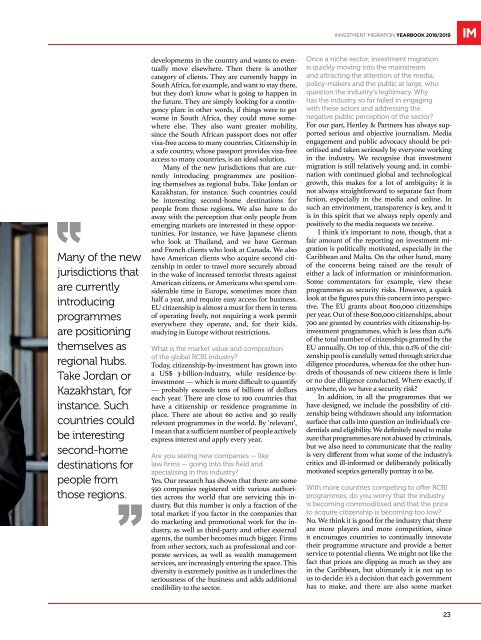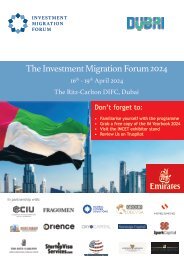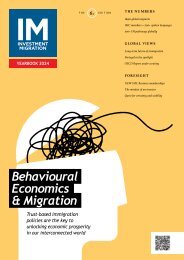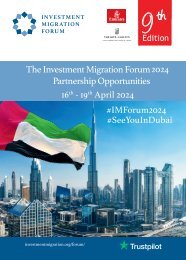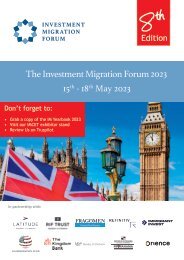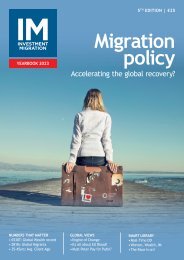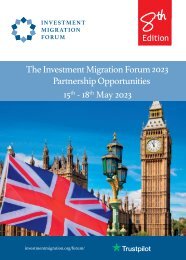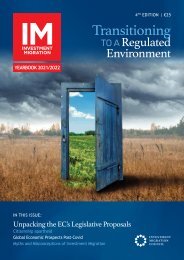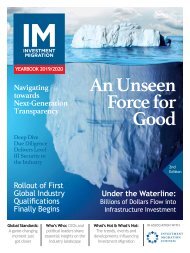IM Yearbook 2018/19
Created out of the need for a global, credible, “go-to” industry publication, the IM Yearbook offers valuable access to a prime target audience of your partners, your peers, and the foremost referral network leading to the world’s most influential RCbI programmes: senior level representatives of the global migration industry, academics, migration agents, migration law firms, wealth managers, UHNWI’s, government representatives, and international organisations involved in migration and citizenship-by-investment.
Created out of the need for a global, credible, “go-to” industry publication, the IM Yearbook offers valuable access to a prime target audience of your partners, your peers, and the foremost referral network leading to the world’s most influential RCbI programmes: senior level representatives of the global migration industry, academics, migration agents, migration law firms, wealth managers, UHNWI’s, government representatives, and international organisations involved in migration and citizenship-by-investment.
- No tags were found...
You also want an ePaper? Increase the reach of your titles
YUMPU automatically turns print PDFs into web optimized ePapers that Google loves.
INVESTMENT MIGRATION YEARBOOK <strong>2018</strong>/20<strong>19</strong><br />
<strong>IM</strong><br />
Many of the new<br />
jurisdictions that<br />
are currently<br />
introducing<br />
programmes<br />
are positioning<br />
themselves as<br />
regional hubs.<br />
Take Jordan or<br />
Kazakhstan, for<br />
instance. Such<br />
countries could<br />
be interesting<br />
second-home<br />
destinations for<br />
people from<br />
those regions.<br />
developments in the country and wants to eventually<br />
move elsewhere. Then there is another<br />
category of clients. They are currently happy in<br />
South Africa, for example, and want to stay there,<br />
but they don’t know what is going to happen in<br />
the future. They are simply looking for a contingency<br />
plan: in other words, if things were to get<br />
worse in South Africa, they could move somewhere<br />
else. They also want greater mobility,<br />
since the South African passport does not offer<br />
visa-free access to many countries. Citizenship in<br />
a safe country, whose passport provides visa-free<br />
access to many countries, is an ideal solution.<br />
Many of the new jurisdictions that are currently<br />
introducing programmes are positioning<br />
themselves as regional hubs. Take Jordan or<br />
Kazakhstan, for instance. Such countries could<br />
be interesting second-home destinations for<br />
people from those regions. We also have to do<br />
away with the perception that only people from<br />
emerging markets are interested in these opportunities.<br />
For instance, we have Japanese clients<br />
who look at Thailand, and we have German<br />
and French clients who look at Canada. We also<br />
have American clients who acquire second citizenship<br />
in order to travel more securely abroad<br />
in the wake of increased terrorist threats against<br />
American citizens, or Americans who spend considerable<br />
time in Europe, sometimes more than<br />
half a year, and require easy access for business.<br />
EU citizenship is almost a must for them in terms<br />
of operating freely, not requiring a work permit<br />
everywhere they operate, and, for their kids,<br />
studying in Europe without restrictions.<br />
What is the market value and composition<br />
of the global RCBI industry?<br />
Today, citizenship-by-investment has grown into<br />
a US$ 3-billion-industry, while residence-byinvestment<br />
— which is more difficult to quantify<br />
— probably exceeds tens of billions of dollars<br />
each year. There are close to 100 countries that<br />
have a citizenship or residence programme in<br />
place. There are about 60 active and 30 really<br />
relevant programmes in the world. By ‘relevant’,<br />
I mean that a sufficient number of people actively<br />
express interest and apply every year.<br />
Are you seeing new companies — like<br />
law firms — going into this field and<br />
specialising in this industry?<br />
Yes. Our research has shown that there are some<br />
550 companies registered with various authorities<br />
across the world that are servicing this industry.<br />
But this number is only a fraction of the<br />
total market: if you factor in the companies that<br />
do marketing and promotional work for the industry,<br />
as well as third-party and other external<br />
agents, the number becomes much bigger. Firms<br />
from other sectors, such as professional and corporate<br />
services, as well as wealth management<br />
services, are increasingly entering the space. This<br />
diversity is extremely positive as it underlines the<br />
seriousness of the business and adds additional<br />
credibility to the sector.<br />
Once a niche sector, investment migration<br />
is quickly moving into the mainstream<br />
and attracting the attention of the media,<br />
policy-makers and the public at large, who<br />
question the industry’s legitimacy. Why<br />
has the industry so far failed in engaging<br />
with these actors and addressing the<br />
negative public perception of the sector?<br />
For our part, Henley & Partners has always supported<br />
serious and objective journalism. Media<br />
engagement and public advocacy should be prioritised<br />
and taken seriously by everyone working<br />
in the industry. We recognise that investment<br />
migration is still relatively young and, in combination<br />
with continued global and technological<br />
growth, this makes for a lot of ambiguity: it is<br />
not always straightforward to separate fact from<br />
fiction, especially in the media and online. In<br />
such an environment, transparency is key, and it<br />
is in this spirit that we always reply openly and<br />
positively to the media requests we receive.<br />
I think it’s important to note, though, that a<br />
fair amount of the reporting on investment migration<br />
is politically motivated, especially in the<br />
Caribbean and Malta. On the other hand, many<br />
of the concerns being raised are the result of<br />
either a lack of information or misinformation.<br />
Some commentators for example, view these<br />
programmes as security risks. However, a quick<br />
look at the figures puts this concern into perspective.<br />
The EU grants about 800,000 citizenships<br />
per year. Out of these 800,000 citizenships, about<br />
700 are granted by countries with citizenship-byinvestment<br />
programmes, which is less than 0.1%<br />
of the total number of citizenships granted by the<br />
EU annually. On top of this, this 0.1% of the citizenship<br />
pool is carefully vetted through strict due<br />
diligence procedures, whereas for the other hundreds<br />
of thousands of new citizens there is little<br />
or no due diligence conducted. Where exactly, if<br />
anywhere, do we have a security risk?<br />
In addition, in all the programmes that we<br />
have designed, we include the possibility of citizenship<br />
being withdrawn should any information<br />
surface that calls into question an individual’s credentials<br />
and eligibility. We definitely need to make<br />
sure that programmes are not abused by criminals,<br />
but we also need to communicate that the reality<br />
is very different from what some of the industry’s<br />
critics and ill-informed or deliberately politically<br />
motivated sceptics generally portray it to be.<br />
With more countries competing to offer RCBI<br />
programmes, do you worry that the industry<br />
is becoming commoditised and that the price<br />
to acquire citizenship is becoming too low?<br />
No. We think it is good for the industry that there<br />
are more players and more competition, since<br />
it encourages countries to continually innovate<br />
their programme structure and provide a better<br />
service to potential clients. We might not like the<br />
fact that prices are dipping as much as they are<br />
in the Caribbean, but ultimately it is not up to<br />
us to decide: it’s a decision that each government<br />
has to make, and there are also some market<br />
23


